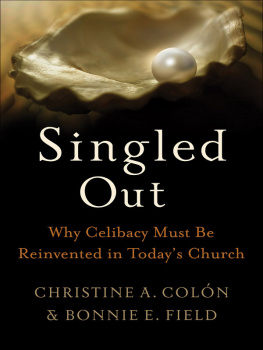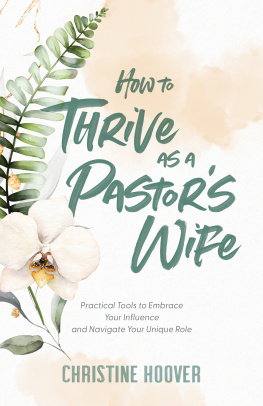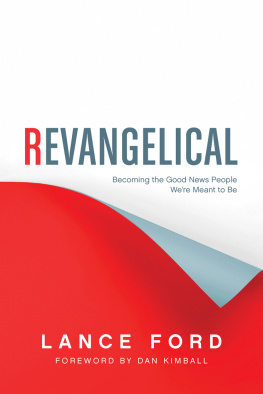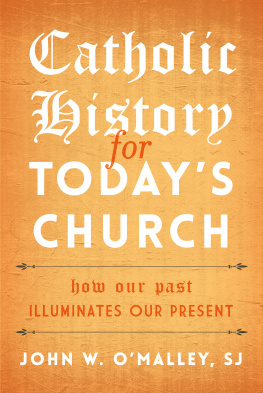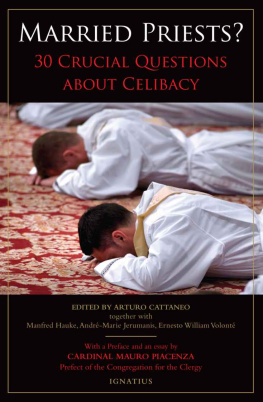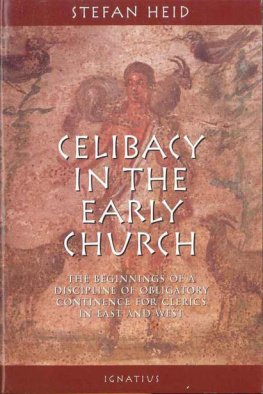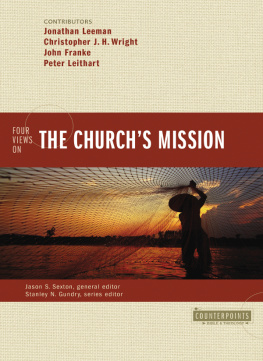Christine Colón - Singled Out: Why Celibacy Must Be Reinvented in Todays Church
Here you can read online Christine Colón - Singled Out: Why Celibacy Must Be Reinvented in Todays Church full text of the book (entire story) in english for free. Download pdf and epub, get meaning, cover and reviews about this ebook. year: 2009, publisher: Baker Publishing Group, genre: Romance novel. Description of the work, (preface) as well as reviews are available. Best literature library LitArk.com created for fans of good reading and offers a wide selection of genres:
Romance novel
Science fiction
Adventure
Detective
Science
History
Home and family
Prose
Art
Politics
Computer
Non-fiction
Religion
Business
Children
Humor
Choose a favorite category and find really read worthwhile books. Enjoy immersion in the world of imagination, feel the emotions of the characters or learn something new for yourself, make an fascinating discovery.
- Book:Singled Out: Why Celibacy Must Be Reinvented in Todays Church
- Author:
- Publisher:Baker Publishing Group
- Genre:
- Year:2009
- Rating:5 / 5
- Favourites:Add to favourites
- Your mark:
- 100
- 1
- 2
- 3
- 4
- 5
Singled Out: Why Celibacy Must Be Reinvented in Todays Church: summary, description and annotation
We offer to read an annotation, description, summary or preface (depends on what the author of the book "Singled Out: Why Celibacy Must Be Reinvented in Todays Church" wrote himself). If you haven't found the necessary information about the book — write in the comments, we will try to find it.
Singled Out: Why Celibacy Must Be Reinvented in Todays Church — read online for free the complete book (whole text) full work
Below is the text of the book, divided by pages. System saving the place of the last page read, allows you to conveniently read the book "Singled Out: Why Celibacy Must Be Reinvented in Todays Church" online for free, without having to search again every time where you left off. Put a bookmark, and you can go to the page where you finished reading at any time.
Font size:
Interval:
Bookmark:
Singled
Out
Singled
Out
Why Celibacy Must Be
Reinvented in Todays Church
CHRISTINE A. COLN
& BONNIE E. FIELD

2009 by Christine A. Coln and Bonnie E. Field
Published by Brazos Press
a division of Baker Publishing Group
P.O. Box 6287, Grand Rapids, MI 49516-6287
www.brazospress.com
Printed in the United States of America
All rights reserved. No part of this publication may be reproduced, stored in a retrieval system, or transmitted in any form or by any meansfor example, electronic, photocopy, recording without the prior written permission of the publisher. The only exception is brief quotations in printed reviews.
Library of Congress Cataloging-in-Publication Data
Coln, Christine A., 1968
Singled out : why celibacy must be reinvented in todays church / Christine A. Coln
and Bonnie E. Field.
p. cm.
Includes bibliographical references (p. ).
ISBN 978-1-58743-237-8 (pbk.)
1. Single peopleReligious life. 2. CelibacyChristianity. 3. Evangelicalism. I. Field,
Bonnie E., 1969 II. Title.
BV4596.S5C655 2009
248.47dc22 2009007341
Scripture is taken from the New America Standard Bible , Copyright 1960, 1963, 1968, 1971,
1972, 1973, 1975, 1977, 1995 by The Lckman Foundation. Used by permission.

Contents
Introduction: Our Journey
4. Sin & Selfishness: Negative Christian Views of Celibacy
6. Happiness & Maturity: Dangerous Messages about Sex and Marriage
9. Discipline & Community: Views of Celibacy in Contemporary Christian Thought
We would like to thank all of the friends and family who encouraged us on our journey, read early drafts of chapters, and put up with seemingly endless discussions about celibacy.
We would also like to offer special thanks to Jane Beal, Bill Gentrup, and Joy Wooddell for reading our entire manuscript and offering their invaluable insights and suggestions. And to Laura Miguelez and Ruth Anne Reese for keeping us theologically and biblically sound.
Most of all, we would like to thank our Lord Jesus Christ who did not deliver us from the difficult times but showed us why we had to go through them.
Introduction
Our Journey
Coworker: Its easier to be killed by a terrorist than it is to find a husband
over the age of 40!
Annie: That statistic is not true!
Becky: Thats right. Its not true, but it feels true.
Sleepless in Seattle
I want a man. We cant even count the number of times that sentence was uttered in the phone conversations we had with each other in our twenties. We had made it through our good, Christian college educations without the MRS degree and were now stuck, quite literally, in no mans land. Friends and family were full of consoling words: Maybe in your new job, Maybe in graduate school, Maybe when you go on vacation. But as the years went by, the consolation began to transform into desperation: Maybe you should join a gym, Maybe you should try the internet, Maybe you should try a new church, Maybe you should get out of English literature and into a field with more men. We couldnt really blame our friends and family because we certainly hadnt come up with any better ideas. We were locked in a frustrating cycle, and none of our actions bore any fruit. We wanted to be married. In fact, we had done everything right to insure that when the men God had in store for us arrived, we would be ready. But they didnt arrive, and we were left wondering, What does that mean? Where have we gone wrong? As our twenties shifted into our thirties, these questions became more pointed. Our conversations were no longer punctuated with I want a man. Instead, they were filled with whats wrong with me? and why doesnt God seem to care?
As we began to search for answers, we realized that in most of the churchs discussions about singleness and celibacy, no one was really talking to us. If we had been high school students ready to sign our pledge cards, committing ourselves to wait until marriage, then, yes, we would have had a support group. As thirtysomethings, however, we soon discovered that the evangelical world, which so often revolves around the nuclear family, didnt quite know what to do with us. There were no support groups for virgins over thirty, probably because no one seemed to think we existed. But if you think the refrain of wait is difficult for a sixteen-year-old to hear, try being in your mid-thirties when you have already waited quite awhile for that promised mate to come along. Then you begin to realize that, despite all the positive rhetoric about your soul mate arriving when you least expect it, he or she may never arrive. The phrase wait until marriage begins to lose its power when you realize that the marriage part may never come. It wasnt that we disagreed with the sentiment, and it certainly wasnt that we were going to relinquish our moral standards and live like seemingly everyone else. But we needed more. Being celibate today means being caught between the casual sex mentality of the secular world and the family values of the evangelical Christian world. In order to withstand the pressures from both sides, we needed to arm ourselves first with a positive understanding of celibacy that moved beyond the simple command to wait and then with a supportive community that not only acknowledged our existence but also valued our participation.
As we continued to search for this message, we discovered that the word celibacy is virtually absent from all evangelical discussions of singleness. There are certainly discussions of abstinence, but by the very nature of the word, they focus on what is being relinquished or avoided. Sex is often seen as the ultimate goal, and abstinence is often promoted as a short stage to endure that will ultimately make married sex much better because of the wait. Any discussion of long-term abstinence takes on a negative tone of deprivation, so it is generally avoided. Similarly, virginity is seen as something that will eventually be relinquished, preferably to ones spouse. Both terms imply that our focus must be on guarding ourselves from sexual temptation until God grants us the blessing of marriage. But what if our thirties, forties, and fifties arrive, and we arent married? And where does this message leave those who are no longer virgins but seek to live a God-honoring single life? Discussions of virginity in particular often leave those who were once sexually active feeling like they are damaged goods undeserving of Gods forgiveness, and for those who have been sexually abused, these conversations can be painful reminders of their past trauma. Within recent years, there have been more positive discussions centering on the word chastity. These discussions have come a long way in providing a more positive image of sexuality for single Christians that moves beyond a focus on virginity. The unfortunate thing is that most of these discussions are led by Christians who practiced single chastity for only two or three years before getting married and practicing married chastity. While it is important to see chastity as a virtue that should be practiced in singleness as well as marriage, the temptation is once again to see singleness only as preparation for marriage.
Frustrated with the evangelical discussions of singleness, we turned to the early church fathers for help. Unfortunately, many of the early discussions of celibacy are predicated on the belief that sex is evil and that women are temptresses who should be avoided at all costs. Later Catholic discussions have a more positive view of sex (and women), but they generally view celibacy as a voluntary life-long decision. Such conversations do not accommodate those who would like to marry but do not know if they ever will.
Next pageFont size:
Interval:
Bookmark:
Similar books «Singled Out: Why Celibacy Must Be Reinvented in Todays Church»
Look at similar books to Singled Out: Why Celibacy Must Be Reinvented in Todays Church. We have selected literature similar in name and meaning in the hope of providing readers with more options to find new, interesting, not yet read works.
Discussion, reviews of the book Singled Out: Why Celibacy Must Be Reinvented in Todays Church and just readers' own opinions. Leave your comments, write what you think about the work, its meaning or the main characters. Specify what exactly you liked and what you didn't like, and why you think so.

